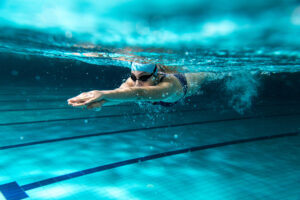In the second part of our mini-series on triathlons, we look at some of the principles behind training for a triathlon.

It is difficult to give highly specific training programmes as each person will have different training schedules and motives. Some people will be happy with their running but need extra help with swimming. Some people will want to build speed while others will focus on endurance. So, in this article, we focus more on the concepts behind training for a triathlon. We also suggest speaking to one of our personal trainers for more specifically-focussed advice.
Training for triathlons does not need to take hours
Successfully training for a triathlon is a question of organising your time and listening to your body. It doesn’t need as much time as people may think. Plus, the variety in training means you are less likely to pick up injuries than if you were all-out training for one activity. A common mistake to avoid is to think you have to do an entire triathlon in each training session – that is absolutely not the case.
How long does it take when training for a triathlon?
If you are planning on doing a triathlon but you have not been seriously training for a while (or ever), then give yourself at least 12 weeks to get ready for your first event.
By giving your body this time and building up to the event steadily, you will condition muscles, tendons and ligaments.You will also build up your endurance levels so the event doesn’t become a torture.
Training commitment
Four to five weekly workouts of 45-50 minutes, plus one long workout when you can devote a little more time – one and half to two hours.

Out of the five weekly workouts, make two of them swimming. Make two of the other workouts bike-to-run combination workouts. This will help you build endurance and ready your body for the transition phase. Make your 90-120 minute session a long bike ride so you get used to being in the saddle for extended periods of time.
Here is a sample of two combination workouts for your first week of training for a triathlon:
Combo 1: Run 1 minute, walk 1 minute for 10 minutes, then bike for 30 minutes at a steady pace. Repeat the Run 1 minute, walk 1 minute for a further 10 minutes but gradually slowing the pace of the run so it doubles as a cool down.
Combo 2: Run 5 minutes, bike for 10 minutes, repeat 3 times.
(Both of these training sessions can be done in a gym on machines or in the open air).
To progress your training over the 12 weeks, keep to these principles but increase the pace of both the running and cycling.
Here is a sample training session that you should comfortably manage by week six.
Workout 1: Swim 5 x 100 metres with 20 seconds recovery between each interval.
Workout 2: Run 25 minutes at steady pace, Bike 20 minutes hard pace.
Workout 3: Swim 400 metres steady pace. 5 minutes recovery time. 5 x 50 metres, pushing maximum speed. 100 metres recovery swim.
Workout 4: Bike 25 minutes pushing hard rate. Straight into 20 minute run, with 30 seconds accelerations every two minutes.
Plan in rest and recovery
There is a temptation to add more and more distance to your training but your body needs a balance of rest and stress. Make sure you add recovery days (add in some Yoga or Pilates) and also drop the volume of your training as you approach competition day.

Some top tips to help your triathlon training.
Unless you are a highly competent swimmer, get some swim coaching. Most people can splash around and stay afloat but to swim properly and efficiently you should get some advice from a qualified swimming coach.
Get some basic knowledge of bike maintenance. During your training, there are likely to be times when you encounter a flat tyre or a broken chain. By learning how to do simple bike maintenance, you can save yourself time, money and frustration.
Stay hydrated and eat well. Throughout your training you should make sure that your nutritional and hydration needs are met. Your diet should be the same as any other health conscious person’s diet. High in slow-burning, low-glycemic carbohydrates, fresh fruit and vegetables and water. Low in processed foods, refined carbohydrates and saturated fats.
If you would like to enter a triathlon, check out the British triathlon website for events near you.







